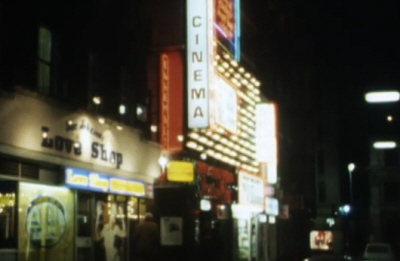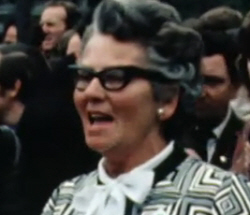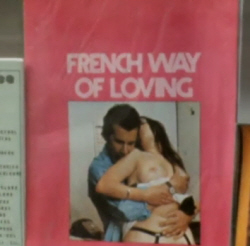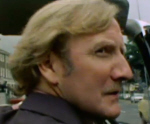Mary Whitehouse
The Upholder of our Moral Values
We often think of the 1960s as the high point of sexual liberation, an endless orgy in the summer sunshine of swinging
London. But of course, the swinging 60s only actually happened to about 14 people in the few privileged enclaves. For ordinary
men and women, it was only in the 1970s that the great tectonic plates of sexual liberation really began to shift.
Sex, once banished beneath the bed clothes, by the early 1970s had burst out into the open. And at the cutting edge of
this cultural Revolution was a brazen, booming business, imported from that notorious den of iniquity, Continental Europe. Porn.

Seedy Soho
The heart of the British sex industry, here in these seedy alleyways of Soho, boasted a total of 54 sex shops, 39 cinema clubs, 16
strip and peep shows, and 12 licensed massage parlours. Most of them open 24 hours a day, seven days a week.

Mary Whitehouse
During the 1960s, many of Britain's neighbours had embraced the new sexual frankness with unsettling enthusiasm. And
now, extravagantly explicit material from red light Amsterdam and free-thinking Copenhagen had found its way
to buttoned up Britain.
In the 70s there was a sense of the kind of wildness, with sex breaking out from beyond its boundaries, invading the
kind of public spaces from which it had been previously absent. The influx of XXX rated European pornography transformed
the British market. In this full frontal battle for customers, coy was out, explicit was in.
Even old-fashioned, bawdy humour was becoming crassly obscene. With the cinema audiences in freefall, the British film industry
created a whole new genre, the 70s sex comedy. The French had the exotic eroticism of Emmanuelle. We had spying on schoolgirls
in the shower.

Nudie Magazine
Confessions of a Window Cleaner, the lowest point in British cinema history, and, embarrassingly, the highest grossing
film of 1974. Even prime-time family entertainment was splattered with sexual references.
And say "hello" to Lesley Phillips, his libido was unleashed in his nominally comic efforts. For people who had been
brought up in an older, more conservative moral regime, all of this was profoundly shocking. It was as though an
entire moral order was falling apart.
Gathered under the banner of the Festival of Light, thousands marched to demonstrate their outrage. This was the voice
of the traditionalist, Christian counterrevolution.
Mary Whitehouse, the Shropshire schoolmistress, was determined to clean up filth wherever she found it. And the reliably provocative
European film industry gave her something to really complain about.
In January 1973, a team of censors, the British Board of Film Classification, sat down to watch a film called Last Tango
in Paris. It was to prove one of the most controversial pictures in British cinema history. Directed by Bernardo Bertolucci,
Last Tango is classic 70s arthouse erotica. Charting the intense relationship between Marlon Brando's shabby widower, And
a young Parisienne, half his age. It's a bleak, misanthropic vision, punctuated by loveless, sadomasochistic sex. So, it
gave the censors plenty to think about.

Outraged Protestors
The censors gave last Tango and X certificate. But the film generated a flood of complaints. Last Tango was banned by
17 local councils, indeed, no other film has ever provoked as many letters to the film censors. One letter writer wrote
"I never usually write letters, perhaps I'm one of the silent majority, but I'm very angry and somewhat frightened by
the pressure of people like Mary Whitehouse and the Festival of Light. Is this a free society or not?"
I suppose what you get from the letters is a real sense of the vigour and contentiousness of the debate. This wasn't a
reasoned argument between two sides that were prepared to listen to one another. This was an argument between, I suppose,
an old Britain based on conservative moral values and faith and tradition and so on, and the new Britain, based on the
individual exercise of personal choice. And, in many ways, that confrontation, is the key to the whole decade.
The Festival of light campaigners battled on, urging the government to crack down on the plague of pornography. But
by February 1974. Edward Heath was locked in a very different battle, in which his political survival was at stake.




